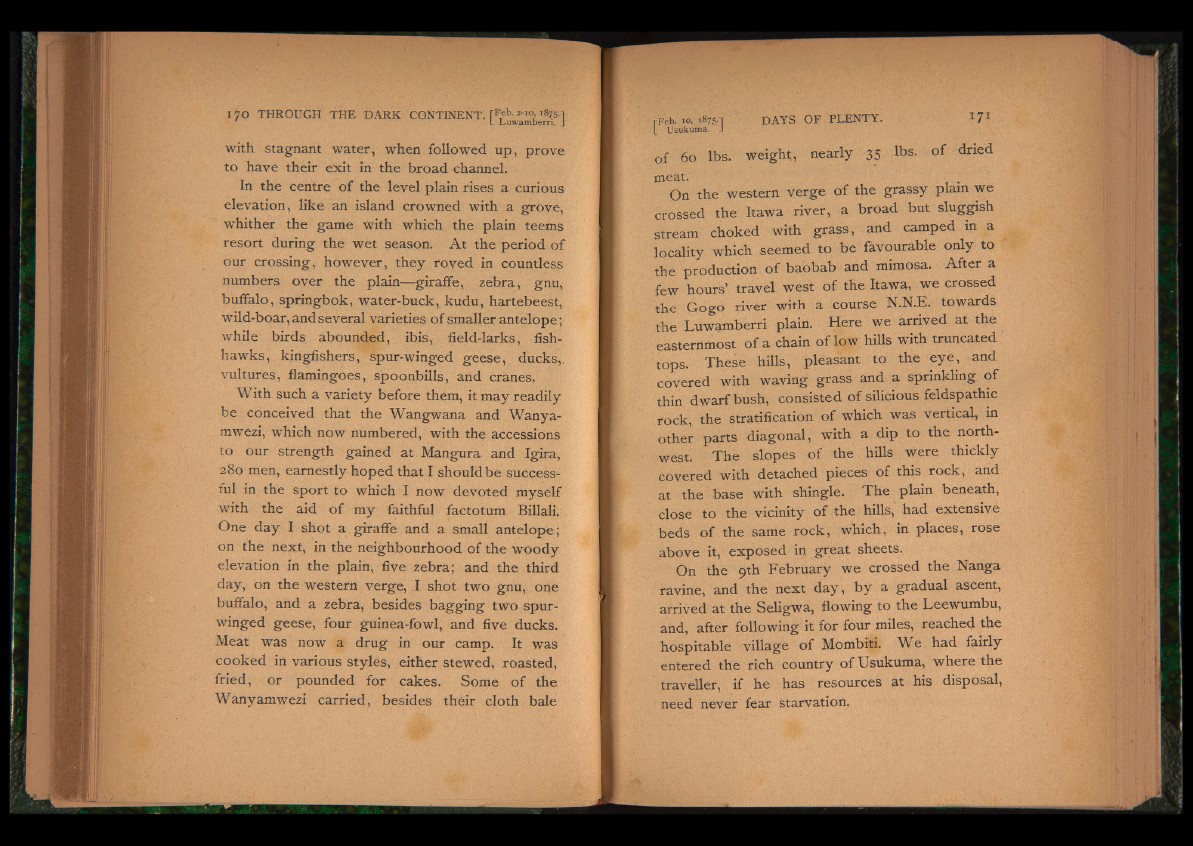
with stagnant water, when followed up, prove
to have their exit in the broad channel.
In the centre o f the level plain rises a curious
elevation, like an island crowned with a grove,
whither the game with which the plain teems
resort during the wet season. A t the period o f
our crossing, however, they roved in countless
numbers over the plain— giraffe, zebra, gnu,
buffalo, springbok, water-buck, kudu, hartebeest,
wild-boar, and several varieties o f smaller antelope ;
while birds abounded, ibis, field-larks, fish-
hawks, kingfishers, spur-winged geese, ducks,,
vultures, flamingoes, spoonbills, and cranes.
With such a variety before them, it may readily
be conceived that the Wangwana and Wanya-
mwezi, which now numbered, with the accessions
to our strength gained at Mangura and Igira,
280 men, earnestly hoped that I should be successful
in the sport to which I now devoted myself
with the aid o f my faithful factotum Billali,
One d a y I shot a giraffe and a small antelope;
on the next, in the neighbourhood o f the w o od y
elevation in the plain, five zebra; and the third
day, on the western verge, I shot two gnu, one
buffalo, and a zebra, besides bagging two spurwinged
geese, four guinea-fowl, and five ducks.
Meat was now a drug in our camp. It was
co oked in various styles, either stewed, roasted,
fried, or pounded for cakes. Some o f the
Wanyamwezi carried, besides their cloth bale
r i F e b . io, 1875.1 DAYS OF PLENTY. I 7I
t Usukuma. J
of 60 lbs. weight, nearly 35 lbs. o f dried
meat.
On the western v e rg e o f the grassy plain we
crossed the Itawa river, a broad but sluggish
stream choked with grass, and camped in a
locality which seemed to be favourable only to
the production o f baobab and mimosa. A fter a
few hours’ travel west o f the Itawa, we crossed
the Gogo river with a course N.N.E. towards
the Luwamberri plain. Here we arrived at the
easternmost o f a chain o f low hills with truncated
tops. These hills, pleasant to the e y e , and
covered with waving grass and a sprinkling o f
thin dwarf bush, consisted of silicious feldspathic
rock, the stratification o f which was vertical, in
other parts diagonal, with a dip to the northwest.
T he slopes o f the hills were thickly
covered with detached pieces o f this rock, and
at the base with shingle. T h e plain beneath,
close to the vicinity o f the hills, had extensive
beds o f the same rock, which, in places, rose
above it, exposed in great sheets.
On the 9th February we crossed the Nanga
ravine, and the next d a y , b y a, gradual ascent,
arrived at the Seligwa, flowing to the Leewumbu,
and, after following it for four miles, reached the
hospitable village o f Mombiti. W e had fairly
entered the rich country o f Usukuma, where the
traveller, if he has resources at his disposal,
need never fear starvation.